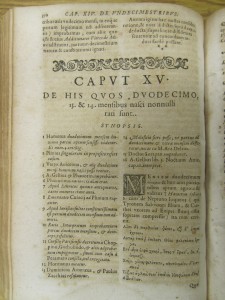It’s surprising, but true, that the laws of nature sometimes find themselves at the mercy of the courts. I found a great example of this in a book that the Law Library recently acquired for its rare book collection. Tractatus juridicus & practicus, de partu of Alonso Carranza (Cologne, 1629) is a staggeringly comprehensive book about human embryology and its relationship to the law. Carranza, a Spanish jurist, adopts a wide perspective for his study, including sources from the Canon Law of the Catholic Church as well as from Roman law and Spanish law. He talks about conception, the development of the fetus, pregnancy, legitimacy, inheritance, and abortion, into which he mixes theological and philosophical reflections. He also presents a long, learned digression on the interpretation of different kinds of calendars, crucial for calculating the length of pregnancies.
Carranza wrote the whole work in a high scholarly style. This makes those parts of the book especially charming where the author charges off into wild and improbable ideas about biology. In chapter fifteen, for example, which is entitled “Concerning those whom some authorities attest to have been born after pregnancies of twelve, thirteen and fourteen months,” Carranza makes the case for the existence of very long – incredibly long – pregnancies. Pregnancies of nine to ten months are commonplace, he says, but some can continue far longer. In fact, twelve month pregnancies are not so rare; fourteen month pregnancies are not unknown; and according to the inquisitor, Martinus Delrius (Martin Antoine Del Rio, 1551-1608) who touches on the topic in his treatise Disquisitiones Magicarum (Lyon, 1606), witches can maliciously delay a birth indefinitely, which is to say that a pregnancy can last however long you like.
Strange as all of this is to modern sensibilities, Carranza is presenting an old idea – one not unique to Europe - that occurs in many traditional legal systems, namely the late birth. (In Islamic law, for example, the late birth has had a long career as one of the foundations of the laws relating to the presumption of legitimacy. Depending on the school of interpretation you consult, Islamic law can recognize a pregnancy to last up to two years, four years and even five years according to the great Muslim jurist, Malik Ibn Anas (715-795).) The idea was fairly common in Europe under various systems of customary law and under Canon Law until the Napoleonic Code finally put an end to it by determining that no pregnancy would be recognized to last longer than 300 days.
The idea of the late birth entails some very concrete legal consequences, especially regarding legitimacy and inheritance. According to Carranza’s line, for example, a child born more than a year after a man’s death can be recognized as that man’s posthumous heir. A woman who was away from her husband for more than ten months can be saved from accusations of sexual misconduct when she turns up pregnant. Children who might otherwise have lived as outcasts can be recognized by their “fathers” or be otherwise spared the stigma of illegitimacy before the law.

Chapter 15, “Concerning those whom some authorities attest to have been born after pregnancies of twelve, thirteen and fourteen months,”
Common sense probably tells you that the late birth is just a fiction, a tool judges have always used to make life a little easier for people, especially women, who are more or less living out the results of their fallible humanity; who’s ever heard of a fourteen month pregnancy anyway…? If so, your suspicion is nothing new. Carranza’s contemporaries doubted it too. He quotes from an author he opposes, who, taking a more skeptical approach to the topic than he does, asks:
Quis enim non videt, nil concludere, & inania omnia illa esse, quae isti in fundanda pudicitia illius viduae, & excusando partu mensium adducunt?
Roughly: “Is there really anyone who doesn’t see that this is just a trick to get the widow out of trouble?” If this is a naturalistic perspective, Carranza opposes it, arguing first of all that nature itself is unpredictable and full of disorder, and secondly that in any case witchraft is probably to blame. This sounds retrograde enough. But when you consider what intellectual choices he had available to him, something surprising comes into view. We see in fact that it’s the naturalist critic who is much more determined to uncover the guilt of the widow than Carranza is; and considering the severity of the penalties she may be facing, that’s a somewhat cold-hearted position to take. Carranza’s more supernatural worldview on the other hand is more likely to clear her of any wrongdoing, which comes off in this context as the more humane result - a questionable advantage when you consider some of the ways the belief in witches found its way into policy in early modern Europe, but still, an interesting turnaround.



July 27, 2011 at 4:56 pm
A very interesting piece on legal history, well done!
August 3, 2011 at 10:05 am
Excellent piece, Mr. Dorn! Very interesting.
November 25, 2011 at 9:46 am
At least some bloggers can write. Thanks for this article..
November 27, 2011 at 1:34 am
According to Japanese tradition, Empress Jingu was pregnant with the future Emperor Ojin for 3 years, so this idea seems to have existed there, too.
December 28, 2011 at 4:51 pm
Nathan: An addendum – The same issue arose in medieval Jewish Law. See Shulhan Arukh Even haEzer 4:14 and the commentaries